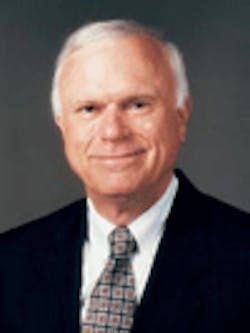Leo Suggs, the president of UPS Freight—formerly Overnite Transportation Co.—is planning to retire at the end of this year, bringing to a close an eventful 10-year period that saw him take over an ailing LTL operation and return it to profitability, fend off a stiff three-year unionizing effort by the International Brotherhood of Teamsters, and finally sell the company to Atlanta-based United Parcel Service (UPS) for $1.25 billion in cash.
Like J.B. Hunt and Jerry Moyes, two self-made trucking legends that retired last year, Suggs will leave his own indelible mark after a nearly 50 year career that saw him start out as a dockworker while in college in North Carolina and end up as the head largest LTL carriers in the U.S.
“Suggs played a pivotal role in building Overnite into one of the four largest LTL carriers in the U.S. and he stayed on board with us to ensure a smooth integration and continued growth,” said Mike Eskew, UPS chairman & CEO. “The addition of UPS Freight bolstered our service portfolio and we expect his contributions during the balance of the year to help us further grow the business and serve our customers.”
Gordon MacKenzie, a longtime friend and colleague of Suggs, will take over as president of UPS Freight once Suggs retires. Jack Holmes, a 27-year UPS veteran manager who headed the UPS Freight transition team will replace Mackenzie as senior vp—operations.
“[Suggs] is one of the most straightforward executives I’ve known,” Ira Rosenfeld, director of communications at UPS Freight, told FleetOwner. “People paid a lot of attention to the annual industry forecasts he used to give at the start of every year.”
The reason the trucking industry paid close attention to Suggs’ market analysis comes in part from his track record. After having worked in various executive positions at Standard Trucking Company, Ryder/PIE Nationwide, and Transcon Lines, along with a three-year stint as president & CEO of Preston Trucking, rail giant Union Pacific (UP) brought Suggs in to take over its badly struggling Overnite LTL subsidiary as chairman & CEO in April 1996.
“I will tell you when he joined Overnite, the company had no focus on profits and posted outrageous rates in the market,” Satish Jindel, president of market research firm SJ Consulting, told FleetOwner. “Suggs brought discipline to that company. He wasn’t a figurehead; he has a hands-on style of business that helped the company drive profit growth and better manage costs and revenues.”
UP had bought Overnite—founded in 1935—in 1986 for $1.2 billion, yet couldn’t get it to mesh with its national rail network
“It was a classic case of a railroad trying to run a trucking company—and running it into the ground,” added UPS Freight’s Rosenfeld. “But I give UP credit—they realized they needed a trucking expert to restore Overnite, and they picked Suggs to do it.”
Suggs brought Mackenzie with him from Preston Trucking to help restore Overnite to profitability. He became the day-to-day operations chief, implementing Suggs’ vision of where the company needed to go.
But the future became uncertain in 1999 when Overnite became the target of a labor organizing effort by the Teamsters. The three-year drive eventually included setting up picket lines at various Overnite terminals throughout the U.S.
Still, despite the turmoil caused by both the labor dispute and the economic disruptions of the Sept. 11 attacks, by 2001 Suggs had returned Overnite to profitability. The company earned then-record profits and revenues of $45.5 million and $1.13 billion, respectively, while improving billing, rating and collection processes, along with reducing accounts receivable by more than $30 million.
In fact, Overnite’s bank account was deep enough to buy Salt Lake City, UT-based regional LTL carrier Motor Cargo in October 2001 for nearly $80 million. This added 10 western states to Overnite’s 32 eastern state territory and for the first time made it a national linehaul player.
Giving Overnite national linehaul status wasn’t an accident on Suggs’ part – it’s what made it attractive to UPS, which bought it in May 2005 for $1.25 billion (a 46% premium) a little less than two years after UP spun Overnite off.
The great irony of course, is that after Suggs fought so hard to keep Overnite a non-union company, once it was purchased by UPS and renamed UPS Freight in May 2006, it was all but inevitable that the Teamsters would get the opportunity to organize it.
In June of this year a “card check” agreement was made between UPS and Teamsters that would allow UPS Freight employees to vote for union representation. UPS said it would recognize the union if over 50% of those employees agreed to representation.
“[The Teamsters] always had the right to come in and try to organize at a UPS Freight location,” Ken Sternad, UPS spokesman, told FleetOwner at the time. “We’re coordinating with Teamsters so [the organizing process] doesn’t become unnecessarily contentious and so we could focus on serving our customers and growing our business. In turn, we’d take a neutral stance.”
For the last five months or so of Suggs’ tenure he plans to keep “fine-tuning” the UPS Freight operation, focusing on reducing transit times and freight claims, said Rosenfeld.
“The whole goal at UPS Freight now is to bring the on-time delivery consistency of UPS’s small package business to the heavy freight market,” Rosenfeld added. “That’s what he’ll be working on.”
To comment on this article, write to Sean Kilcarr at [email protected]
About the Author
Sean Kilcarr
Editor in Chief
Sean Kilcarr is a former longtime FleetOwner senior editor who wrote for the publication from 2000 to 2018. He served as editor-in-chief from 2017 to 2018.
